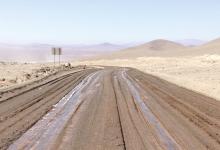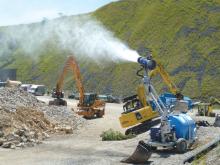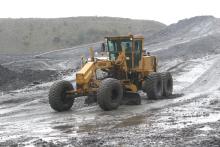In quarries where roads are not paved, dust and road stability are often a problem, especially with heavy trucks carrying out repeated journeys on the same stretch of road.
However, NTI Holdings says that while it has found that for the Pavmax® product to have a very effective result the soil has to have a certain level of plasticity, the bond created with the liquid solution and clay gives a strong and durable dust-free layer of terrain, ready for heavy trucks and
busy traffic on a daily basis.
“With basic machinery, such as graders, rollers, and water trucks, the process is simple and very economic if compared with asphalt built roads,” says NTIHoldings.
Its solution is poured in water and then diluted in less than a minute, simply by the movement of the truck. It is then poured on the graded soil, which absorbs the mixture prior to it being roller compacted.
“The result is a hard surface ready for the long haul. Once pplied correctly, the NTI Holdings’ soil stabilisation product will result in a soil with lower permeability due to increased soil density, which in turn results in a harder, more durable road in both dry and wet weather,” says NTI Holdings.
The product is 100% biodegradable and derives its efficacy on the clay-based fraction of the soil. After applying it, the clay particles present in the soil are no longer attracted to water, allowing for any water in the soil to drain away freely. This results in the clay/soil particles settling closer together and producing lasting soil stabilisation.
“Unlike typical soil stabilisation products, the NTI Holdings’ solution uses the clay in the soil as a binder: not the product itself. Other soil stabilisation products glue the soil together, and once that glue is gone, so are the results. Since our solution uses the clay in the soil as a binder it provides for lasting soil stabilisation".
The road, including quarry haul roads, first needs to be scarified or churned to the desired depth of treatment, and then the soil stabiliser is mixed with water from a tank truck: even distribution of this mix over the area to be treated is essential for proper soil stabilisation.
The next stage in the soil stabilisation process using the NTI Holdings’ solution is mixing, and this can be done simply by blade mixing using a grader or other ripper tools on the grader.
Following rolling, the road is ready for use, although if heavy, high-speed traffic, involving spinning or skidding wheels, is expected, the road can be closed for two or three days to allow curing.
Test time
The product was tested in Chile, South America, in December 2013 on a 5km long, 7m wide and 20cm deep stretch of road in order to observe its behaviour with the local soil. It was also to determine the feasibility of using the NTI Holdings’ solution on vari¬ous segments of a road project, including a 70km
access road for the Hierro Tal Tal Mine, Chile, in the Atacama Desert.
The main challenges facing the project were the very dry conditions and the soil having a very high sand content and low clay content.
The road, to be accessed by over 100 trucks each weighing 50tonnes, on a 24-hour transit basis, is used for the discharging material produced in the Hierro Tal Tal Mine. The road starts from the main entrance of the mine and extends towards the Pan American North Road.
The performance results are said to have been excellent even before the clay was added.
“When the clay was later added to the mix, the cementation process increased exponentially creating exceptional stability and hardness in the road. The results were so impressive that to date, no damage has been reported even after the continuous transit of heavy mining equipment and trucks transporting iron ore.”
Today, the Chilean Ministry of Public Works has approved the NTI Holdings’ solution for public road stabilisation projects, and it is being used in the Dominican Republic, Brazil, Angola, Chile, and Colombia. for more information please email [email protected] or visit www.ntiholdings.com













